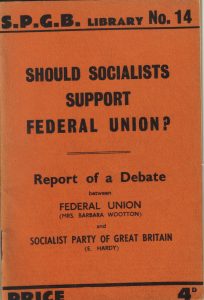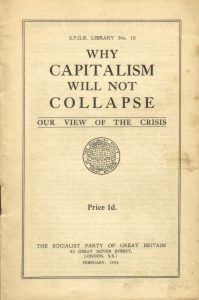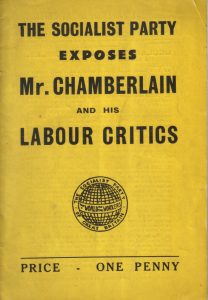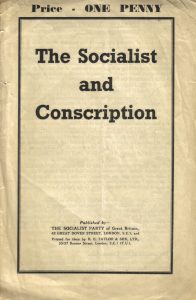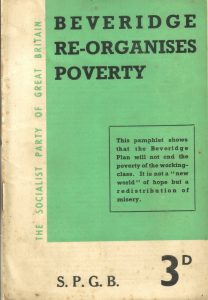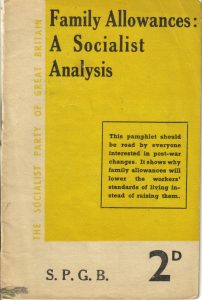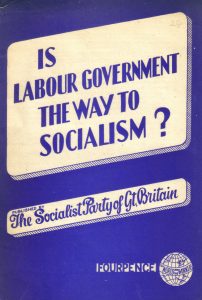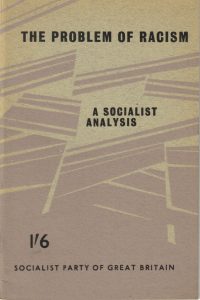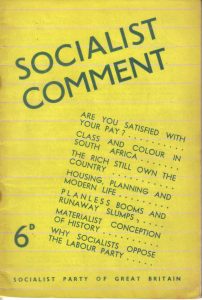Report of a Debate Between Federal Union (Mrs. Barbara Wootton) and The Socialist Party of Great Britain (Mr. E. Hardy)
Chairman Mr. R.G.W MacKay
Debate held at Conway Hall, London: May 6th, 1940
THE CHAIRMAN, in opening the proceedings, said the debate had been arranged jointly by the organisation known as Federal Union and by the Socialist Party of Great Britain. Mrs. Barbara Wootton would answer the question, “Should Socialists support Federal Union?” in the affirmative, and Mr. Hardy would answer it in the negative.
Mrs. Wootton would first speak for thirty minutes and then Mr. Hardy would speak for thirty minutes, after which they would speak in the same order for twenty minutes and then for ten minutes. There would be no speeches or questions from members of the audience.
Read more "Book Review: ‘A World Without Money or Politicians’"
P R E F A C E
This pamphlet consists of articles published originally on the Socialist Standard. It is a record, in collected form, of the attitude of the Socialist Party of Great Britain to events in Russia since 1917. In March of that year the Czarist regime collapsed and was followed, after short-lived stop-gap Ministry, by the Kerensky Government which was a coalition of various reformist parties. This Government was opposed by the Bolsheviks who, under the leadership of Lenin and Trotsky, overthrew it and seized power in October, 1917.
Read more "Book Review: ‘A World Without Money or Politicians’"
FOREWORD
We are in the midst of a crisis that is world-wide. Every country feels its ravages. Millions and millions of workers are unemployed and in acute poverty. Everywhere there is discontent and a feeling of insecurity, and the prestige of even the strongest of governments has been shaken. All sorts of emergency measures have been hastily adopted, but the depression still continues. Working men and women who normally ignore such questions, are now asking why the crisis has occurred, what will be its outcome, and whether it could have been avoided. In some minds there is a fear, and in others a hope, that the industrial crisis may bring the present system of society down in ruins, and make way for another.
Read more "Book Review: ‘A World Without Money or Politicians’"
So the crisis is over. Representatives of the four major European Powers sat round the table and concluded arrangements that carve up Czechoslovakia, freeze Russia out of Europe, and, we are fervently assured, lay the basis of “peace in our time”. Lest there should be any doubt about this peaceful future, a great drive to develop armaments is proposed, and plans are being made to ensure that everybody will have a niche in defensive and offensive operations. The temporary popularity of Chamberlain, the general relief at the banishing of immediate war danger, and the united support worked up on behalf of the Czechs, are being utilised to push forward the increased armament campaign.
Read more "Book Review: ‘A World Without Money or Politicians’"
In spite of repeated promises to the contrary, conscription is to become the law of this country during peace time. It is the first occasion that such a drastic denial of democracy will have been brought into operation here when war was not in progress. Already we are warned of the kind of scenes we shall witness—the prosecution of unwilling conscripts, the charges of shirking and the encouragement of tale-bearing by those who suspect their friends and neighbours of avoiding conscription. A Staff Reporter of the Daily Express writes:
“Those who are personally summoned and fail to answer will probably be treated as deserters. As in the great war, the authorities are relying on ‘the next-door neighbour with a son in the Army’ to denounce a shirker” (Daily Express, 28th April, 1939).
It is worthy of note that conscription has promptly received the support of a leader of the Church, the Bishop of St. Albans.
Read more "Book Review: ‘A World Without Money or Politicians’"
This pamphlet shows that the Beveridge Plan (*) will not end the poverty of the working-class. It is not a “new world” of hope but a redistribution of misery. (1943)
* All references, except where otherwise stated, are to “Social Insurance and Allied Services,” Report by Sir William Beveridge. H. M. Stationary Office. Price 2s.
SHOULD SOCIALISTS WORK FOR SOCIAL REFORM?
Read more "Book Review: ‘A World Without Money or Politicians’"
This pamphlet should be read by everyone interested in post-war changes. It shows why family allowances will lower the workers’ standards of living instead of raising them. (1943)
Sir John Anderson (Lord President of the Council) announced in the House of Commons on February 16th, 1943, that the Government had accepted the principle of State paid non-contributory children’s allowances. This announcement arose from the consideration of the comprehensive plan for a reform of the social services presented in the Report of Sir William Beveridge, who has been a firm supporter of Family Allowances for a number of years. The Government’s statement follows fairly closely on the decision of the Trades Union Congress to accept a recommendation of their General Council along the same lines, although it should be observed that a similar recommendation was rejected by the Trades Union Congress at Nottingham 1930.
Read more "Book Review: ‘A World Without Money or Politicians’"
Preface
The end of the second world war saw the election of a Labour Government in Great Britain. There have been other Labour Governments, in 1924 and 1929-31, but this time the Labour Government was returned with an overwhelming majority of M. P.’s in the House of Commons. On the earlier occasions the Labour M. P.’s were in a minority and the Labour Government was consequently dependent for its continued tenure of office on the support of the Liberal Party. For this reason supporters of the Labour Government pleaded that Labour Party policy had not had a fair trial; it had always to be modified to please the Liberals. Consequently when things went wrong, the failure of the Labour Governments was excused on the ground that they were “in office but not in power.”
Read more "Book Review: ‘A World Without Money or Politicians’"
Preface
Socialism is an international question that concerns workers of all countries. One of the hindrances to its acceptance is race-prejudice which sets groups against each other on grounds of colour, religion, and so forth. Before the workers can really understand their fundamental unity they must get rid of this false and harmful race-prejudice.
In the pages that follow the reader will find a statement of the attitude of the Socialist Party of Great Britain to the problem. To treat it fully would require a volume, not a pamphlet; but to draw out and explain the essentials of race-prejudice is, we consider, sufficient for our present purpose.
Read more "Book Review: ‘A World Without Money or Politicians’"
This pamphlet consists of a selection of articles that appeared in the Socialist Standard during 1955 and 1956. They have been published because they deal with issues of current interest and give the Socialist Party’s attitude to them in a handy form.
CONTENTS
1. The Rich Still Own the Country
2. Are You Satisfied with Your Pay?
3. Planless Booms and Runaway Slumps
4. Housing, Planning and Modern Life
5. Class and Colour in South Africa
6. Why Socialists Oppose the Labour Party
7. The Materialist Conception of History
THE RICH STILL OWN THE COUNTRY
LABOUR SPOKESMEN ADMIT OUR CHARGE
Read more "Book Review: ‘A World Without Money or Politicians’"
